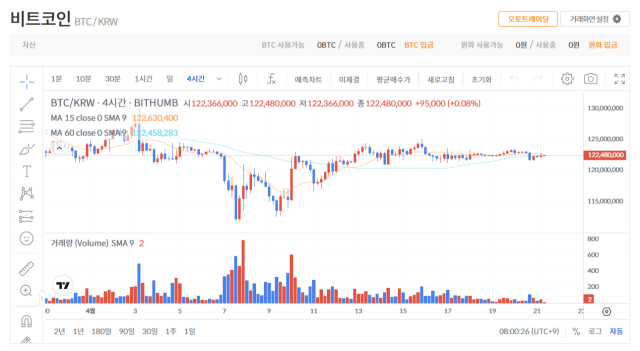
As Bitcoin (BTC) fails to break through the 85,000 dollar resistance line, warnings are emerging that this rebound could be a 'Bull Trap'. The analysis suggests that the intensification of Trump-led tariff wars is dampening risk asset investment sentiment.
According to CoinMarketCap, a global virtual asset market site, BTC was traded at 84,815.88 dollars as of 8 am on the same day. This is a 0.5% decline from the previous day. At the same time, Ethereum (ETH), the leading altcoin, recorded a 2.26% drop at 1,581.32 dollars. XRP dropped 0.91% and was traded at 2.068 dollars per coin. Solana (SOL) fell 1.88% to 136.77 dollars.
Related Articles
- Bitcoin Fluctuates Around 85,000 Dollars... Will It Break Out of the Box? [Decenter Market Conditions]
- Bitcoin Maintains Strong Parity Amid Dollar Weakness and Tech Stock Decline... "Will 2023 Rally Reappear?" [Decenter Market Conditions]
- Bitcoin Drops Back to 83,000 Dollars... Market Tense Due to Dead Cross [Decenter Market Conditions]
- Bitcoin Rebounds on Tariff Exemption News... Fluctuating Around 85,000 Dollars [Decenter Market Conditions]
Major virtual asset prices also fell across domestic exchanges. At Bithumb, BTC recorded a 0.48% drop from the previous day at 122,397,000 won. ETH fell 2.18% to 2,284,000 won, and XRP was traded at a 0.73% decline at 2,987 won.
As BTC fails to break through the 85,000 dollar resistance line, warnings are emerging that this rebound could be just a Bull Trap, a false rebound signal in a bearish market. Bloomberg's Senior Commodity Strategist Mike McGlone said, "As Donald Trump's global trade war intensifies, investors are moving towards safe-haven assets like gold, and risk assets like BTC may continue to underperform."
He pointed out that risk assets, including BTC, are showing movements to revert to the 200-week moving average (MA). As of the 20th (local time), BTC's 200-week moving average is around 46,300 dollars, approximately 45% lower than the current market price.
Meanwhile, concerns about the impact of Trump-led tariff wars on the economy are growing. The Financial Times reported on the 19th (local time) that "More than 10 banks have lowered their year-end S&P 500 forecast since Trump announced reciprocal tariffs on the 2nd of this month."
Citigroup lowered its forecast from 6,500 to 5,800, noting that "Uncertainty is eroding stable growth sentiment" and "This could be the first bearish market triggered by a US president."
Virtual asset investment sentiment remains subdued. Alternative.me's Crypto Fear & Greed Index rose 5 points from the previous day to 37 points, indicating a state of 'fear'. This index means that the closer it is to 0, the more constrained the investment sentiment, and the closer to 100, the more overheated the market.

- Reporter Kim Jung-woo
- woo@sedaily.com
< Copyright ⓒ Decenter, Unauthorized Reproduction and Redistribution Prohibited >








